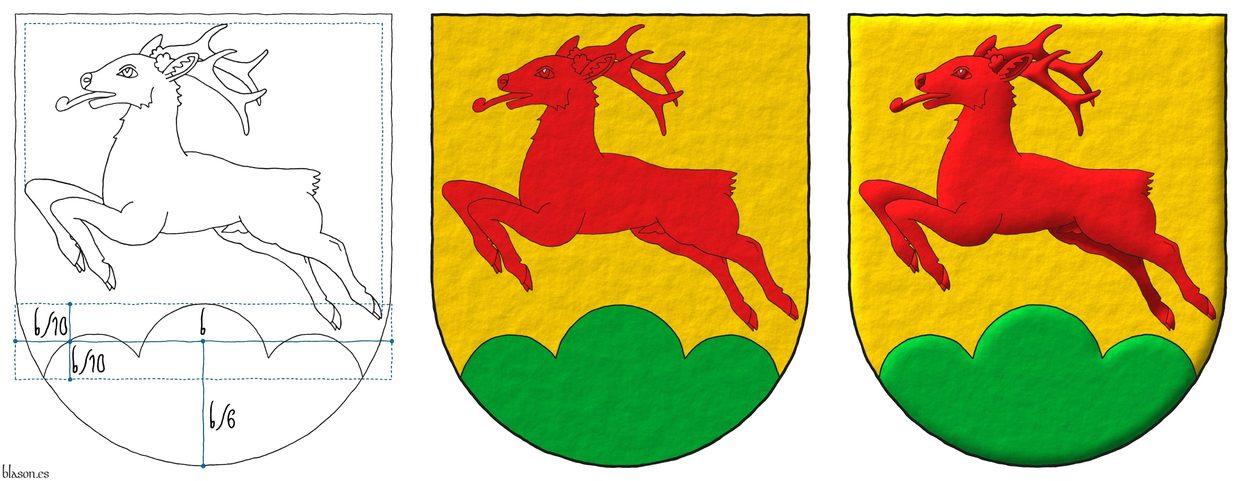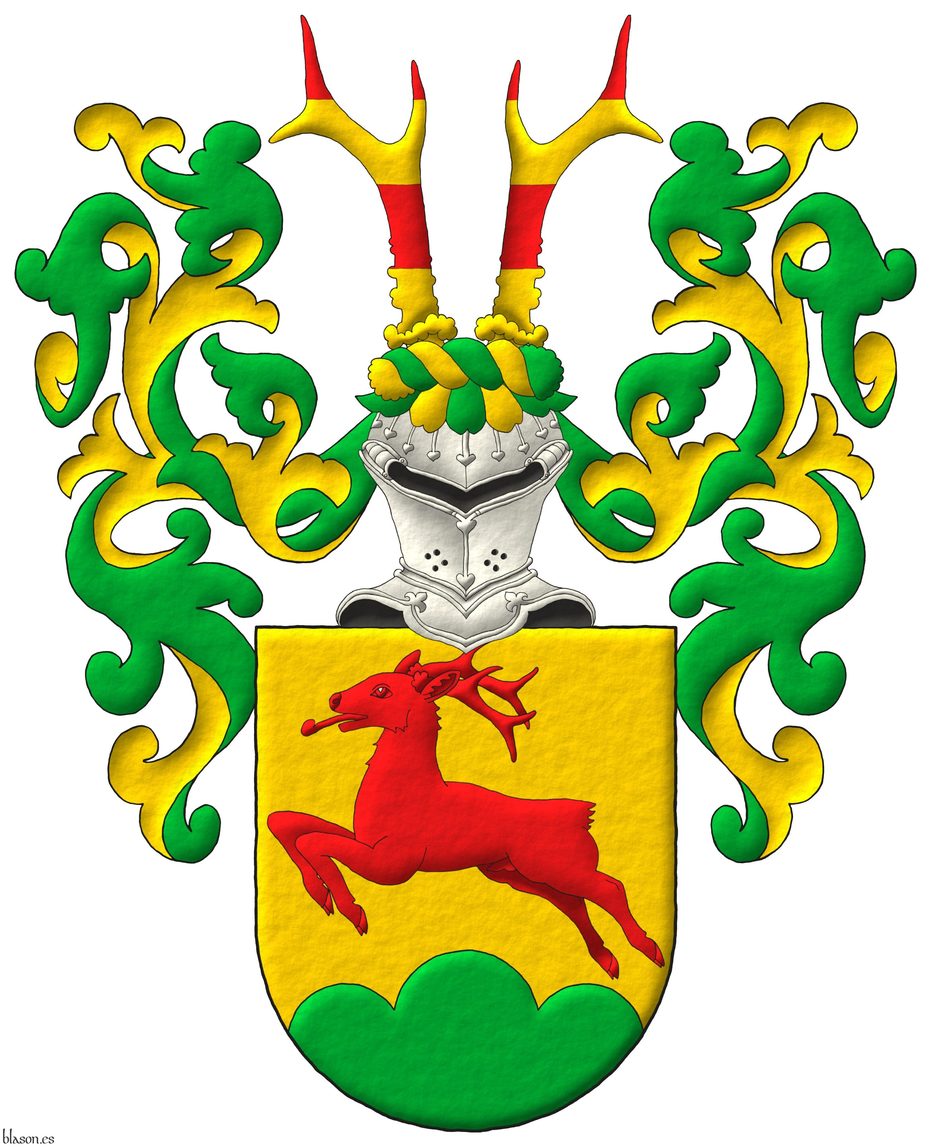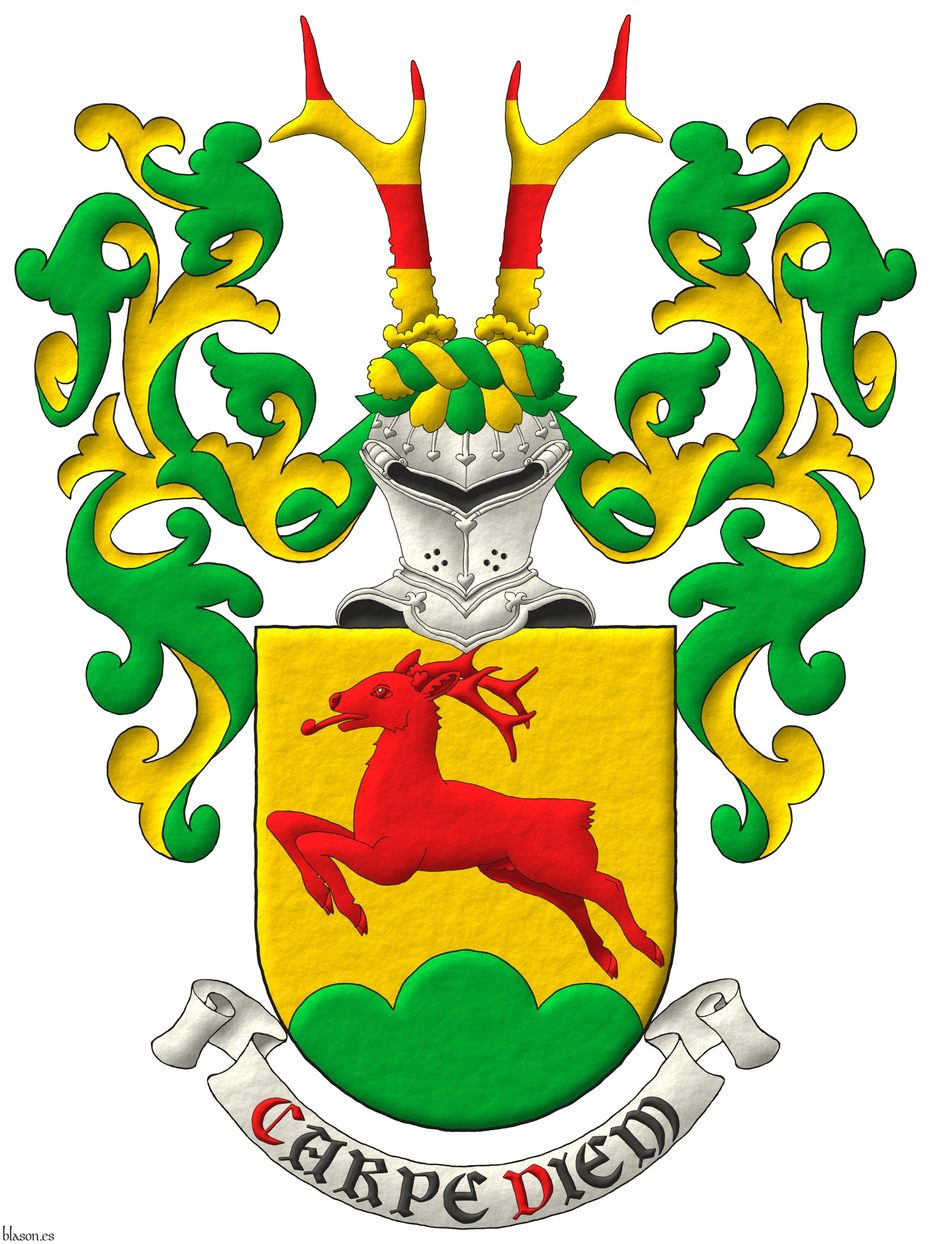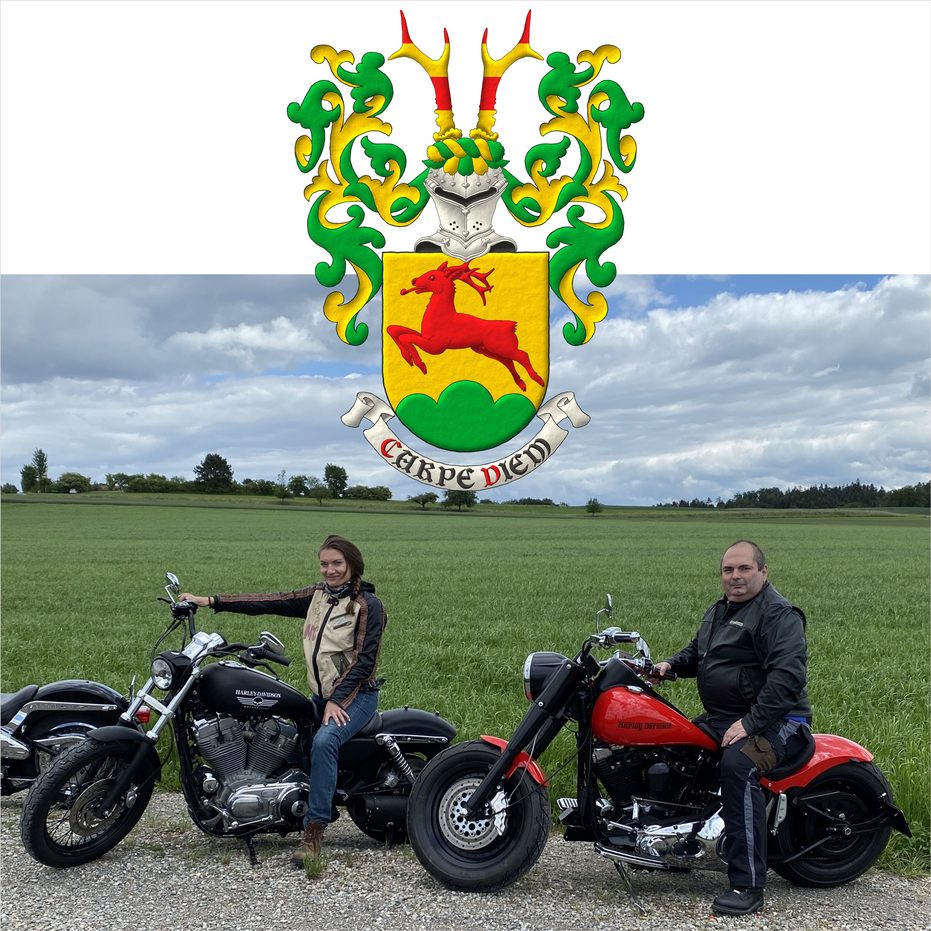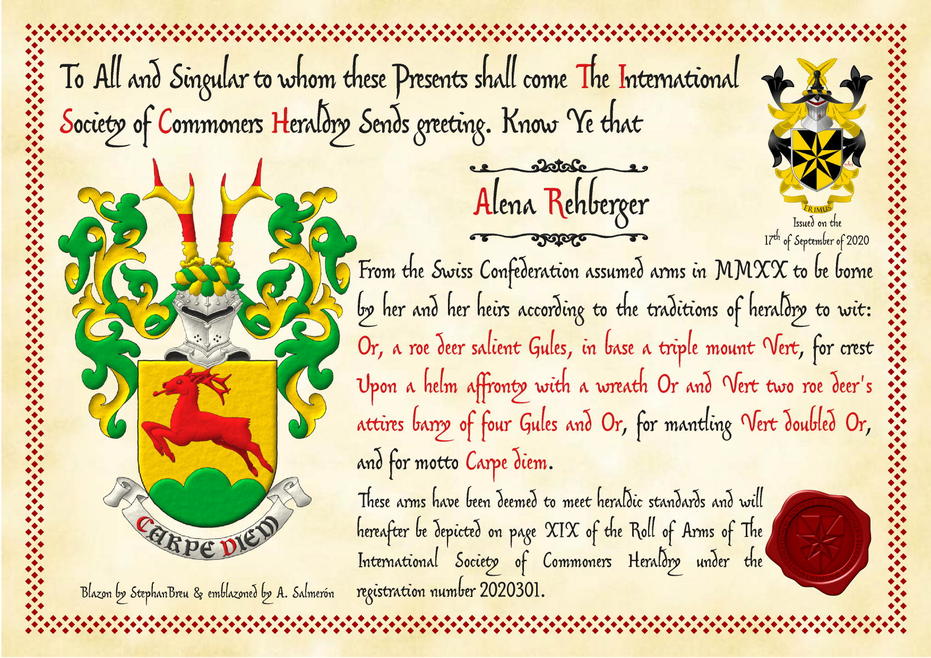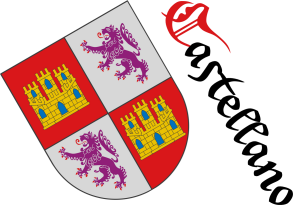
The coat of arms of Alena Rehberger in 3 steps
Or, a roe deer springing Gules, in base a triple mount Vert.
Credits: Stephan Urs Breu is the designer of the coat of arms and Antonio Salmerón y Cabañas is the author of the heraldic art.
Blazon keywords: Or, One, Roe deer, Springing, Gules, In base, Trimount and Vert.
Style keywords: Outlined in sable, Semi-circular, Plain tincture, Illuminated and Leather.
Classification: Personal, Interpreted, Coat of arms and Schema.
Bearer: Rehberger, Alena.


Coat of arms of Alena Rehberger
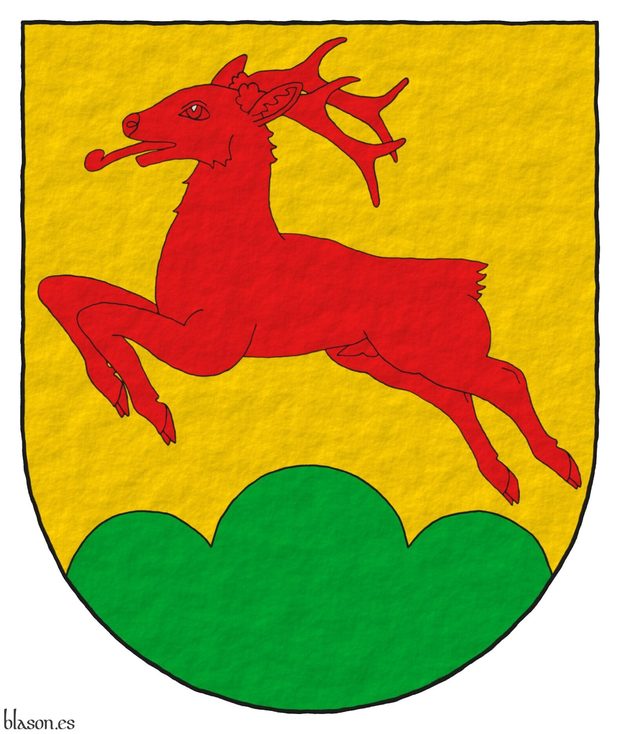
Or, a roe deer springing Gules, in base a triple mount Vert.
Escudo de oro, un corzo brincante de gules, en punta un monte de tres peñas de sinople.
Tongues out
This is a reflection on tongues protruding in animals in heraldry. I will rely on the representations in [Fox-Davies, A. C.; 1909], which include numerous depictions of animals in a wide range of heraldic attitudes.
In heraldry, tigers [Fox-Davies, A. C.; 1909; figures 322–325], lions, wolves, bears, etc., are commonly shown with their tongues out. These are heraldic beasts and carnivores.
However, the fox [Fox-Davies, A. C.; 1909; figures 343–345] is not shown with its tongue out. It is classified as a heraldic beast and is also carnivorous.
The boar is an omnivore, a heraldic beast, and is depicted with its tongue out [Fox-Davies, A. C.; 1909; figures 353–358].
From this, it’s clear that having the tongue out is not uniformly associated with being a heraldic beast or being carnivorous.
On the other hand, [Fox-Davies, A. C.; 1909; figures 446–449] classifies eagles as birds, not beasts. They are carnivorous and shown with their tongues out.
Dolphins, which are carnivorous fish, are also depicted with tongues protruding [Fox-Davies, A. C.; 1909; figures 479–480].
Some heraldists claim that herbivores are never shown with their tongues out.
But donkeys, mules, and especially horses —all herbivores— can indeed be shown with tongues out. For example, [Fox-Davies, A. C.; 1909; figures 360 and 362] depict horses with tongues out, though figure 361, where the horse is running, does not. In no case are horses classified as heraldic beasts.
[Fox-Davies, A. C.; 1909; figures 368 and 370] show the talbot, the mythical heraldic dog, with its tongue out when rampant or passant, but not when standing or seated. This might suggest that a protruding tongue is related to dynamic postures. However, we saw in the previous paragraph that a running horse isn’t necessarily drawn that way.
The bull [Fox-Davies, A. C.; 1909; figures 375–376] is not depicted with its tongue out. Nevertheless, I do paint bulls with tongues protruding. And although bulls are herbivores, I defend the heraldic bull as one of the most beastly figures in heraldry.
Stags never appear with tongues out in any of their postures [Fox-Davies, A. C.; 1909; figures 379–386], nor do other cervids [Fox-Davies, A. C.; 1909; figures 387–390] as the roe deer of this coat of arms.
Rams, sheep, lambs, and goats also do not [Fox-Davies, A. C.; 1909; figures 395–403].
The badger, like the fox, is carnivorous [Fox-Davies, A. C.; 1909; figure 409], yet also lacks a protruding tongue.
In conclusion, a protruding tongue cannot be consistently associated with heraldic beasts or carnivores. Nor can the absence of a tongue be linked solely to herbivores or to peaceful postures. For instance, lions are always shown with tongues out, even in their calmest attitudes [Fox-Davies, A. C.; 1909; figures 304–309].
Ultimately, it is up to the heraldic artist to decide whether to depict the tongue, depending on what they want to express. Greater aggression, motion, or liveliness may justify a protruding tongue. As a symbol of liveliness and agility, in this case, but perhaps not in others, I paint this roe deer with its tongue hanging out.
Credits:
- Stephan Urs Breu is the designer of the coat of arms.
- Antonio Salmerón y Cabañas is the author of the heraldic art.
Blazon keywords: Or, One, Roe deer, Springing, Gules, In base, Trimount and Vert.
Style keywords: Outlined in sable, Semi-circular and Plain tincture.
Classification: Personal, Interpreted and Coat of arms.
Bearer: Rehberger, Alena.


Rehberger, Alena
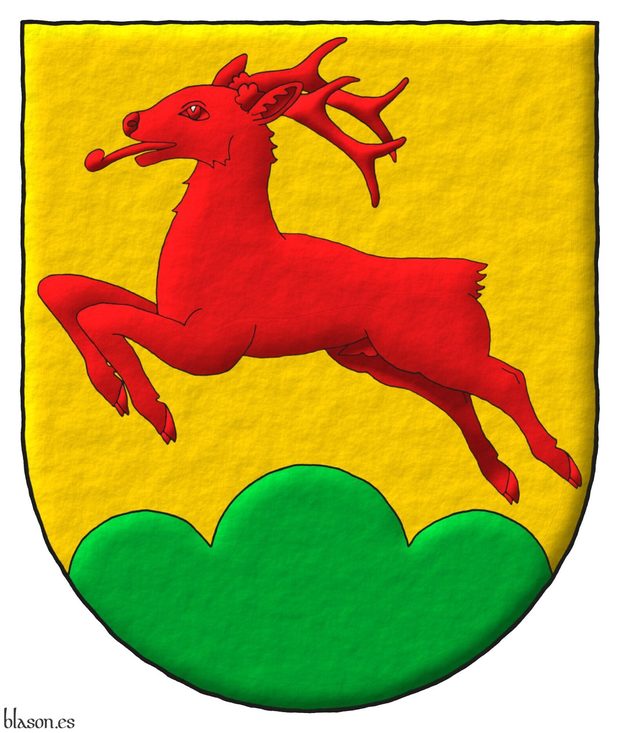
Or, a roe deer springing Gules, in base a triple mount Vert.
Escudo de oro, un corzo brincante de gules, en punta un monte de tres peñas de sinople.
Coat of arms emblazoned by me with a semi-circular shape, illuminated, and with a freehand finishing.
They are canting arms: «Rehberger» ~ «Reh-berger» in Deutsch ~ «Roe deer-from the mountain» in English.
Credits: Stephan Urs Breu is the designer of the coat of arms and Antonio Salmerón y Cabañas is the author of the heraldic art.
Blazon keywords: Or, One, Roe deer, Springing, Gules, In base, Trimount and Vert.
Style keywords: Outlined in sable, Semi-circular, Illuminated and Freehand.
Classification: Personal, Interpreted and Coat of arms.
Bearer: Rehberger, Alena.


Alena Rehberger
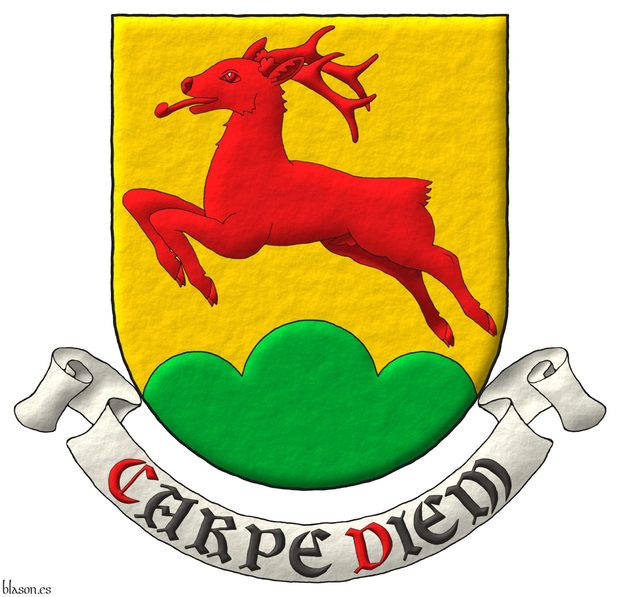
Or, a roe deer springing Gules, in base a triple mount Vert. Motto: «Carpe diem».
Escudo de oro, un corzo brincante de gules, en punta un monte de tres peñas de sinople. Lema: «Carpe diem».
Credits:
- Stephan Urs Breu is the designer of the coat of arms.
- Antonio Salmerón y Cabañas is the author of the heraldic art.
Blazon keywords: Or, One, Roe deer, Springing, Gules, In base, Trimount, Vert and Motto.
Style keywords: Outlined in sable, Semi-circular, Illuminated and Freehand.
Classification: Personal, Interpreted, Coat of arms and Latin language.
Bearer: Rehberger, Alena.


Crest of Alena Rehberger
Or, a roe deer springing Gules, in base a triple mount Vert. Crest: Upon a helm affronty, with a wreath Or and Vert, two roe deers' attires barry of four Gules and Or. Mantling: Vert doubled Or..
Credits:
- Stephan Urs Breu is the designer of the coat of arms.
- Antonio Salmerón y Cabañas is the author of the heraldic art.
Blazon keywords: Or, One, Roe deer, Springing, Gules, In base, Trimount, Vert, Crest and mantling, Helm, Mantling, Wreath, Crest, Two, Roe deers' attires, Barry and Four.
Style keywords: Outlined in sable, Semi-circular, Illuminated and Freehand.
Classification: Personal, Interpreted and Coat of arms.
Bearer: Rehberger, Alena.


Crest and motto of Alena Rehberger
Or, a roe deer springing Gules, in base a triple mount Vert. Crest: Upon a helm affronty, with a wreath Or and Vert, two roe deers' attires barry of four Gules and Or. Mantling: Vert doubled Or.. Motto: «Carpe diem».
Credits:
- Stephan Urs Breu is the designer of the coat of arms.
- Antonio Salmerón y Cabañas is the author of the heraldic art.
Blazon keywords: Or, One, Roe deer, Springing, Gules, In base, Trimount, Vert, Crest and mantling, Helm, Mantling, Wreath, Crest, Two, Roe deers' attires, Barry, Four and Motto.
Style keywords: Outlined in sable, Semi-circular, Illuminated and Freehand.
Classification: Personal, Interpreted, Coat of arms, Latin language and Photographic.
Bearer: Rehberger, Alena.


Commoners' certification for Alena Rehberger
Or, a roe deer springing Gules, in base a triple mount Vert. Crest: Upon a helm affronty, with a wreath Or and Vert, two roe deers' attires barry of four Gules and Or. Mantling: Vert doubled Or.. Motto: «Carpe diem».
Credits: Stephan Urs Breu is the designer of the coat of arms and Antonio Salmerón y Cabañas is the author of the heraldic art.
Classification: Personal, Interpreted, Certification, Heraldic document and English language.
Bearer: Rehberger, Alena.


Berry, Austin Charles
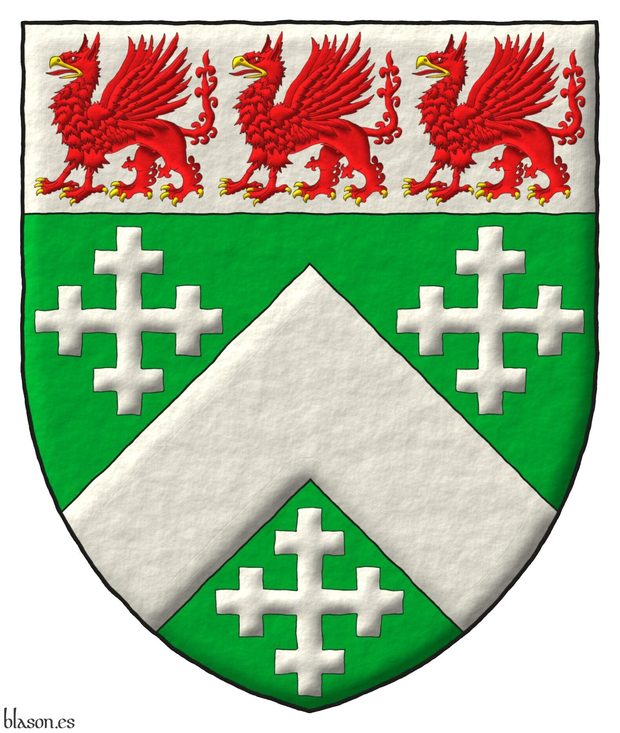
Vert, a chevron, between three cross-crosslets; on a chief Argent, three griffins statant Gules, beaked and armed Or.
Escudo de sinople, un cabrio, acompañado de tres cruces recrucetadas; un jefe todo de plata, tres grifos parados de gules, picados y armados de oro.
Coat of arms emblazoned by me with a pointed shape, illuminated, and with a freehand finishing.
Blazon keywords: Vert, One, Chevron, Between, Three, Cross-crosslet, Cross couped, Chief, Argent, Griffin, Statant, Gules, Beaked, Armed and Or.
Style keywords: Pointed, Outlined in sable, Illuminated and Freehand.
Classification: Personal, Interpreted and Coat of arms.
Bearer: Berry, Austin Charles.

Continue with: Austin Charles Berry.
-
Language
-
Categories of heraldry
-
Divisions of the field
- Without divisions
- Party per pale
- Party per fess
- Party per bend
- Party per bend sinister
- Tierce
- Tierce sinister
- Tierced per pale
- Tierced per fess
- Tierced per bend
- Tierced pallwise inverted
- Quarterly
- Quarterly per saltire
- Gyronny
- Party per fess, the chief per pale
- Party per pale, the sinister per fess
- Party per fess, the base per pale
- Party per pale, the dexter per fess
- Chapé
- Chaussé
- Embrassé
- Contre-embrassé
- Party per chevron
- Enté
- Enté en point
- Flanched
-
Metals
-
Colours
-
Furs
-
Other tinctures
-
Ordinaries and sub-ordinaries
-
Diminutives of the ordinaries
-
Geometric charges
-
Composite ordinaries
-
Inanimate charges from Nature
Atom, Crescent, Diamond, Emerald, Estoile, Increscent, Lightning flash, Moon, Mount, Mullet, Mullet of four points, Orbital, Plough of Ursa Major, Rainbow, Ray of the sun, River, Sea, Snowflake, Sun, Sun in splendour, Sun of May, Terrestrial globe, Trimount, Water and Wave.
-
Vegetal charges from Nature
Acorn, Apple, Apple tree, Ash, Bluebonnet, Camellia, Chrysanthemum, Cinquefoil, Cornflower, Dogwood flower, Double rose, Eguzki-lore, Elm, Fleur de lis, Flower, Gourd, Holm oak, Hop cone, Indian paintbrush, Kapok tree, Laurel, Lily, Linden, Lotus flower, Madonna lily, Mexican cedar tree, Oak, Olive tree, Palm tree, Plantain plant, Pomegranate, Poplar leaf, Rose, Shamrock, Sunflower, Thistle, Tree, Tulip, Vine and Wheat.
-
Animal charges from Nature
Badger, Bald eagle, Barbel, Barn owl, Bear, Beaver, Bee, Beetle, Bighorn sheep, Binson, Blackbird, Boar, Brach hound, Bull, Cow, Doe, Dog, Dolphin, Dove, Eagle, Elephant, Falcon, Female figure, Fish, Flame, Fly, Fox, Frog, Goat, Goldfinch, Goose, Heron, Horse, Hummingbird, Jaguar, Lark, Leopard, Lion, Lion passant, Lion rampant guardant, Lioness, Lynx, Male figure, Martlet, Merino ram, Owl, Panther, Parrot, Peacock, Pelican, Pelican in her piety, Pronghorn, Puffin, Quetzal, Raven, Roe deer, Rooster, Savage, Seagull, Serpent, She-wolf, Stag, Starling, Talbot, Turtle, Tyger, Vulture, Warren hound and Wolf.
-
Parts of natural charges
Arm, Beak, Branch, Caboshed, Chest, Claw, Covert, Dorsal fin, Eagle claw, Ear of wheat, Ermine spot, Escallop, Feather, Foot (palmiped), Foreleg, Forepaw, Hand, Head, Heart, Hoof, Leaf, Neck, Ostrich feather, Palm frond, Paw, Roe deers' attires, Shoulder, Sprig, Stags' attires, Stem, Swallow-tail, Tail, Tail addorsed, Tail fin, Talon, Tibia, Tooth, Trunk, Trunk (elephant), Two hands clasped, Two wings in vol, Udder, Wing and Wrist.
-
Artificial charges
Ace of spades, Anchor, Anvil, Arch, Arm vambraced, Armillary sphere, Arrow, Axe, Bell, Bell tower, Beret, Bonfire, Book, Bookmark, Bow, Branding iron, Bridge, Broken, Buckle, Cannon, Cannon dismounted, Cannon port, Canopy roof, Carbuncle, Castle, Celtic Trinity knot, Chain, Chess rooks, Church, Clarion, Clay pot, Closed book, Club, Column, Comb, Compass rose, Conductor's baton, Cord, Covered cup, Crozier, Crucible, Cuffed, Cup, Cyclamor, Dagger, Displayed scroll, Double vajra, Drum, Ecclesiastical cap, Fanon, Federschwert, Fleam, Four crescents joined millsailwise, Galician granary, Garb, Gauntlet, Geometric solid, Grenade, Halberd, Hammer, Harp, Host, Hourglass, Key, Key ward, Knight, Knot, Lantern, Letter, Line, Loincloth, Maunch, Menorah, Millrind, Millstone, Millwheel, Monstrance, Mortar, Mullet of six points pierced, Nail, Non-classic artifact, Norman ship, Number, Oar, Oil lamp, Open book, Page, Pair of pliers, Pair of scales, Parchment, Pestle, Piano, Pilgrim's staff, Plough share, Polish winged hussar, Port, Portcullis, Potent, Quill, Ribbon, Rosette of acanthus leaves, Sabre, Sackbut, Sail, Scroll, Scythe, Sheaf of tobacco, Ship, Skirt, Spear, Spear's head, Stairway, Star of David, Step, Sword, Symbol, Tetrahedron, Torch, Tower, Trident, Trumpet, Turret, Two-handed sword, Wagon-wheel, Water-bouget, Wheel, Winnowing fan and With a turret.
-
Immaterial charges
Angel, Archangel, Basilisk, Dragon, Dragon's head, Garuda, Golden fleece, Griffin, Heart enflamed, Justice, Mermaid, Our Lady of Mercy, Ouroboros, Paschal lamb, Pegasus, Phoenix, Sacred Heart of Jesus, Saint George, Sea-griffin, Sea-lion, Trinity, Triton, Unicorn, Winged hand and Wyvern.
-
External elements
-
Heraldic creations
-
References
-
Formats
-
Keywords on this page
Between, Pointed, Armed, Berry, Austin Charles, Springing, Wreath, Chevron, Certification, Crest, Roe deer, Cross couped, Cross-crosslet, Four, Roe deers' attires, Outlined in sable, Heraldic document, Two, In base, Coat of arms, Schema, Barry, Photographic, Personal, Griffin, Gules, Illuminated, Interpreted, Chief, Mantling, Motto, English language, Latin language, Semi-circular, Trimount, Or, Statant, Beaked, Leather, Argent, Rehberger, Alena, Vert, Crest and mantling, Plain tincture, Freehand, Three, One and Helm.

